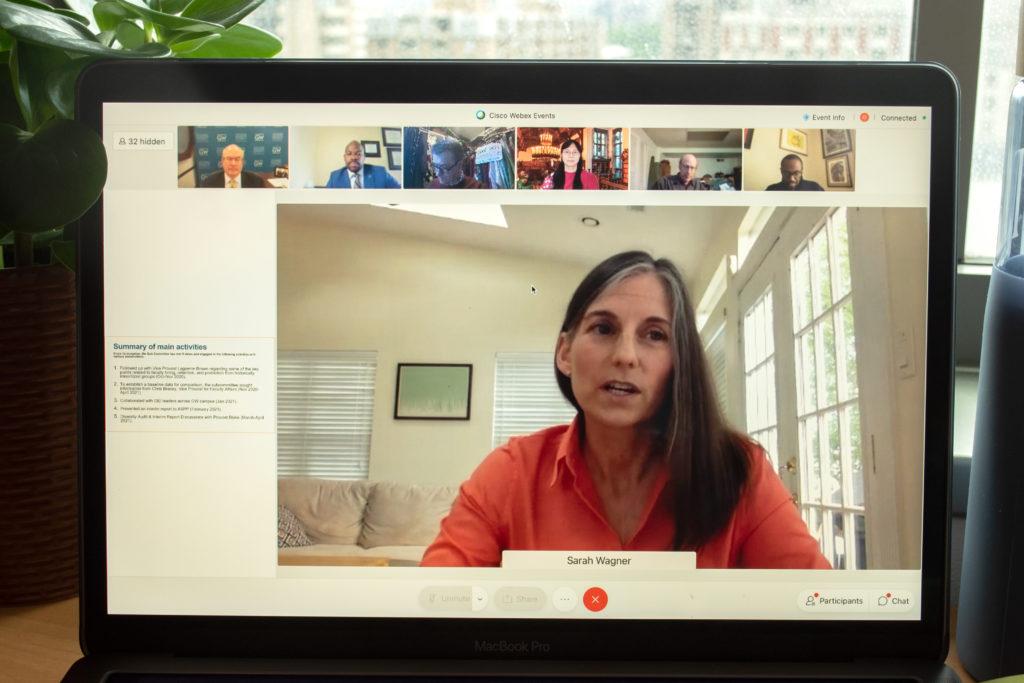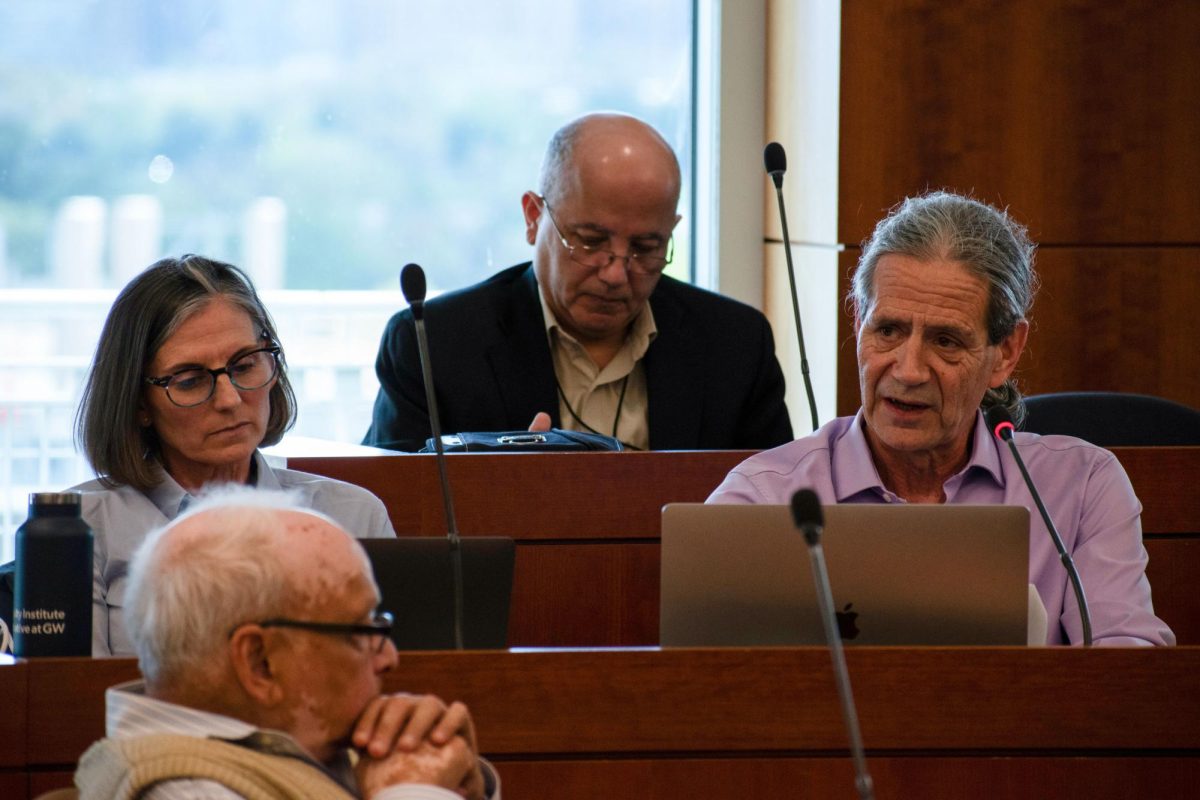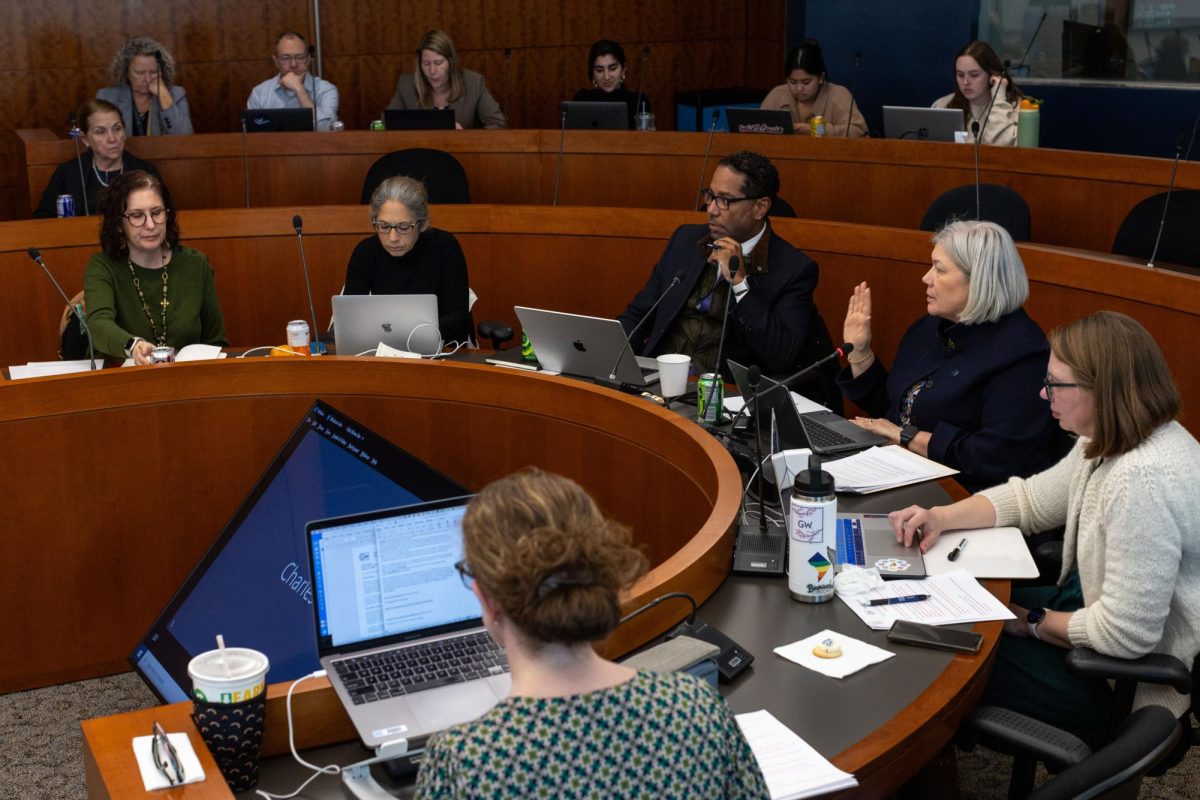Members of the Faculty Senate’s diversity, equity and inclusion subcommittee said increasing representation of underrepresented minority faculty remains a work in progress at a senate meeting Friday.
Subcommittee members compiled baseline data on faculty composition, hiring, departures, promotions and tenure status from the past five years and found that GW’s share of URM faculty – which includes African Americans, Latinos and Native Americans – is insufficient. The group said officials need to streamline the University’s faculty hiring and recruitment processes while cultivating a wider diverse, equitable and inclusive culture among the GW community.
The group said they will hold focus groups with minority faculty members to develop qualitative data about their experiences that the senate and provost’s office can use as guidance for new policies.
“Our focus is faculty – that is, to strengthen diversity, inclusion and equity at the faculty level,” the subcommittee’s presentation from the meeting states.
The group formed under the senate’s committee on appointments, salaries and promotion polices in response to a senate resolution passed in July calling for the University to support diversity, equity and inclusion in hiring practices. An informal group of Columbian College of Arts and Sciences department chairs launched a call earlier this year for officials to implement a “cluster hire” of underrepresented faculty and increase funding to the Africana studies program.
Sarah Wagner, a member of the subcommittee and an associate professor of anthropology, said the group first met with Caroline Laguerre-Brown – the vice provost for diversity, equity and community engagement – to determine key concerns for underrepresented faculty. Laguerre-Brown identified issues with inconsistency in faculty recruiting, hiring and mentoring practices and with the need to cultivate a University-wide culture that prioritizes diversity, equity and inclusion, Wagner said.
“We can’t see faculty DEI work as separate from or disembodied from the experiences and perceptions of students and staff,” Wagner said.
Wagner said the subcommittee members also spoke to Chris Bracey, the vice provost for faculty affairs, to compile the baseline data on faculty composition. URM faculty made up less than 16 percent of new faculty hires and about 12 percent of departures over the past five years, Wagner said.
She said the results indicated that among URM faculty, only 7 percent of assistant professors were promoted to associate status, and only 11 percent of URM associate faculty were promoted to full professors over the past five years period.
“We want to be careful about how we’re interpreting these numbers,” she said. “Nevertheless, what the numbers, especially for promotion from assistant to associate professors, do tell us is that there simply aren’t enough underrepresented minority faculty here at GW. The numbers are strikingly low.”
[gwh_image id=”1143155″ credit=”Courtesy of Faculty Senate Subcommittee on Diversity, Equity, and Inclusion” align=”none” size=”embedded-img”][/gwh_image]
Wagner said the total number of full-time faculty have increased over the past five years, driven by a 17 percent increase in non-tenure-track faculty and an uptick in specialized faculty. But the number of tenured and tenure-track faculty has fallen by more than 5 percent during the same period, which is “not insignificant” because fewer URM faculty are currently tenure-track than White full-time professors, she said.
“A greater percentage of the already very small number of Latinx and African-American faculty are in non-tenure-line positions rather than tenure-line positions,” Wagner said.
Officials’ data on faculty salaries between minorities and non-minorities this year revealed that full professors of color make slightly less than non-minority full professors while minority associate and assistant professors on average earned more than their non-minority counterparts.
Shaista Khilji, a subcommittee member and professor of organizational learning, said at the meeting that the subcommittee held focus groups with diversity, equity and inclusion leaders across GW’s 10 schools in January and asked them questions about areas of improvement and past successful initiatives.
She said the school officials identified common challenges like the absence of a University-wide strategy to support diversity, equity and inclusion and a lack of attention given to nurturing “internal talent” through a University-wide policy for mentorship for faculty of color. The leaders said this in turn leads to high rates of turnover among faculty of color, Khilji said.
“In view of the problems identified above, the DEI leaders argued that GW first identify and establish best practices for mentors,” the subcommittee’s report states.
Khilji said the focus groups also identified a challenge with a lack of accountability and secrecy around the decision-making processes within faculty hiring committees. Some diversity, equity and inclusion leaders said diversity advocates are not always part of these committees, and when they are included, they are not required to complete training to promote consistency in their work, the subcommittee’s report states.
“The solutions they offered is thoughtful cluster hiring, creating pathways for visiting positions to tenure track and strengthening the role of diversity advocates,” Khilji said at the meeting.
Provost Brian Blake said last month that the subcommittee would also be involved in the process of selecting a third-party firm to conduct the University-wide diversity audit once he receives proposals from the firms under consideration. Khilji said the subcommittee recommended Blake works with the Office of Diversity, Equity and Community Engagement to prepare the audit.
“The subcommittee waits to see what our consultative role entails, and if our services are needed for the diversity audit,” the report states.
Khilji said officials should provide resources to diversity, equity and inclusion efforts to demonstrate their commitment to “long-term cultural change” within the University.
“We realize our work is just beginning,” she said.








